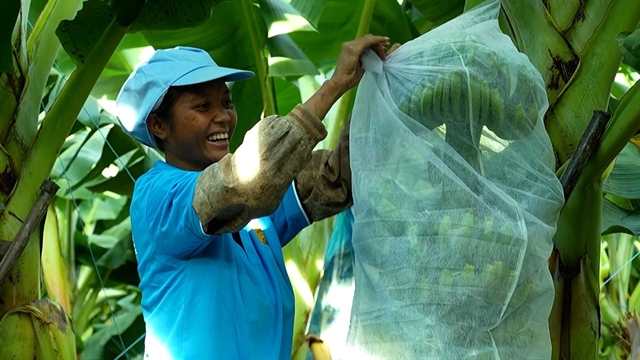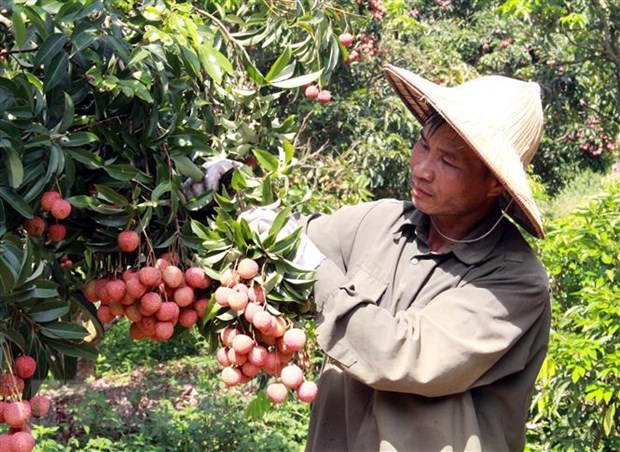 Economy
Economy


|
| A farmer in Bắc Giang Province harvests lychees. The export value of main agricultural products was estimated at $5.9 billion, up 9 per cent year-on-year. — VNA/VNS Photo |
HÀ NỘI — The import-export value of agro-forestry-fisheries products in the first four months of 2021 stood at about US$32.07 billion, with exports estimated at $17.15 billion, a 24.2 per cent increase year-on-year, the Ministry of Agriculture and Rural Development (MARD) has reported.
With an import value of $14.93 billion, Việt Nam posted a trade surplus of about $2.2 billion, down 41.1 per cent year-on-year, according to the ministry.
The export value of main agricultural products was estimated at $5.9 billion, up 9 per cent year-on-year, while the figure for key forestry products was $5.33 billion and fisheries products $2.39 billion, increases of 50.9 per cent and 6.1 per cent, respectively, year-on-year.
Upturns were seen in the export of many products, including rubber (nearly 112 per cent), tea (nearly 8 per cent), rice (1.2 per cent), fruit and vegetables (9.5 per cent), cassava and cassava products (24 per cent), breeding products (37.4 per cent), tra fish (nearly 3 per cent), shrimp (5.5 per cent), and furniture (over 71 per cent).
Falls, meanwhile, were recorded in the export value of coffee, at 11.6 per cent, and cashew nuts, at 7.8 per cent.
Asian markets consumed 46.9 per cent of Việt Nam’s agro-forestry-fisheries products during the period, while the Americas accounted for 27.6 per cent, Europe 10 per cent, Oceania 1.4 per cent, and Africa 1.4 per cent.
The four leading markets were the US, China, Japan, and the Republic of Korea.
Việt Nam also spent $5.01 billion in the first four months on importing agro-forestry-fisheries products, with $1.38 billion outlaid on breeding products, $679 million on aquatic products, $997.4 million on major forestry products, and $2.31 billion on input materials.
The ministry will continue to keep domestic firms informed about new sanitary and phytosanitary (SPS) regulations in major export markets, while maintaining its close watch over the production, price, and supply of farm produce in localities around the country.
Consumption through e-commerce
A number of localities in Sơn La Province have recently supported agricultural product consumption via social networks and e-commerce sites. The move has brought initially positive results compared to traditional methods of consumption.
The use of livestreaming to sell agriculture produce is quite a new concept and only recently applied in Sơn La Province. The effort is the result of co-ordination between a number of individuals, organisations, and local authorities to provide support to the promotion and consumption of local plums.
One hour of livestreaming attracted more than 500,000 views, and after two days the number had increased to more than 3 million, with a total of 20 tonnes of plums sold. Online sales have contributed to promoting the Tam Hoa plum brand among many more people throughout the entire country.
Tam Hoa plums are a high yield crop, and in recent years there have been many localities planting the variety as their main crop. But due to a lack of communication and promotional efforts, they were still mostly consumed locally or in neighbouring areas. To remove the obstacles, the local government established a campaign committee to support the promotion and consumption of plums and of agricultural products in general through social networks and e-commerce sites.
Selling goods online and through e-commerce sites has many benefits, but quality must be ensured when products reach consumers. In order to guarantee the fair sale and uniform quality of agricultural products, authorities at all levels in Son La have created specific lists, giving priority to households that do not use fertilisers or chemical pesticides in the growing process. — VNS




